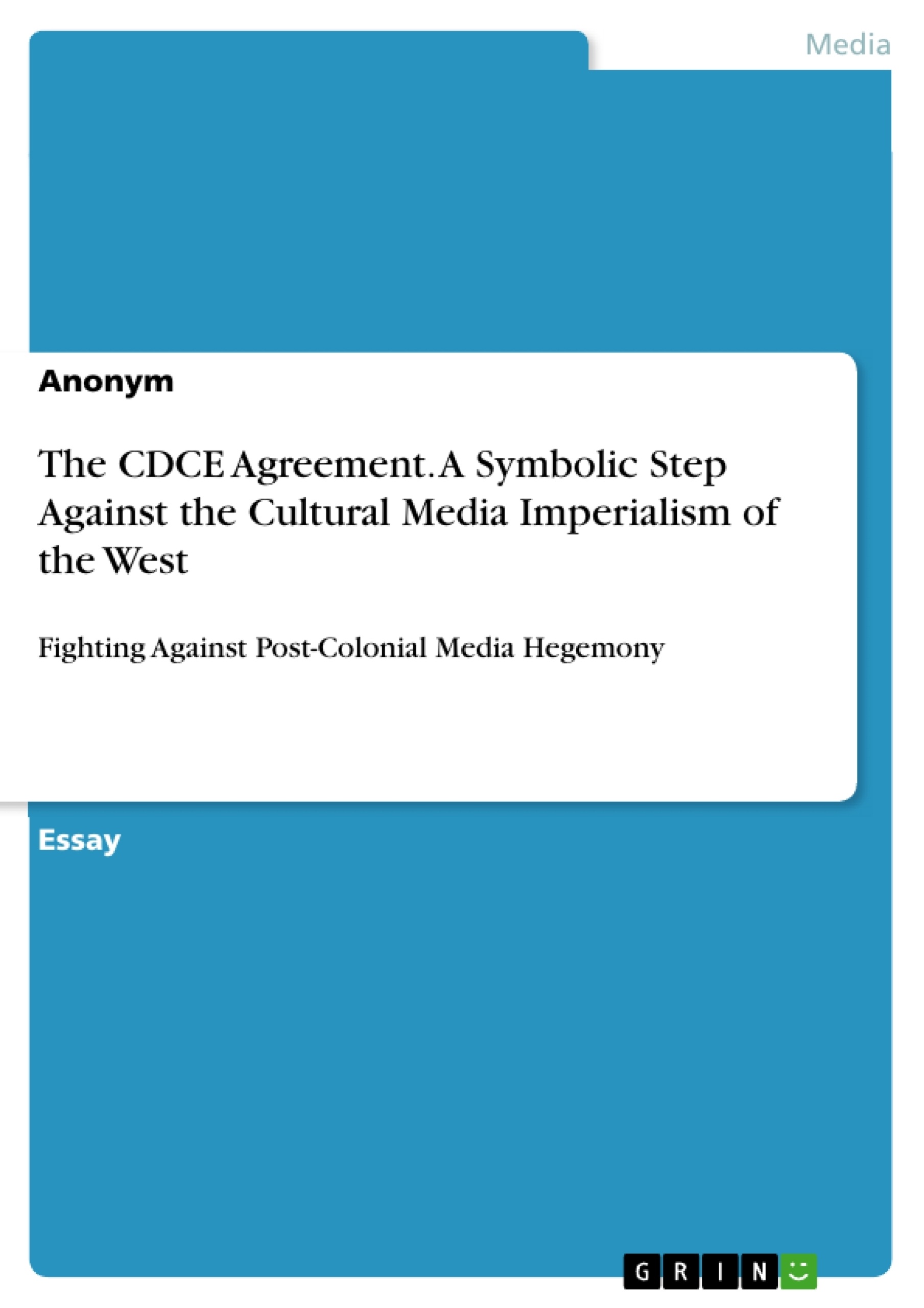The existing gap in the trade agreements concerning a "cultural exception" led me to my thesis statement. It proves the role of the CDCE agreement as a symbolic but crucial step towards cultural diversity in the media sector and against the cultural media imperialism of the West.
For my analysis, I will choose a cultural approach. This approach is very convenient because the political and economic restrictions that were put in law by the CDCE agreement all affected cultural exchanges and supported cultural industries of developing countries. Assisting the developing countries in building up their own media systems to promote cultural expression is an important mechanism of the agreement, which helps to reduce the cultural inequality.
The influence of liberalistic structures on culture grew because of international trade agreements like the WTO or the GATT. Thus, the CDCE agreement is seen as a movement against these liberalistic structures and tends to provide restrictions for cultural industries. Due to the restrictions that are set up to protect the cultural sector, debates about the limitation of the free flow of information increased. The former foreign minister Rice expressed her concern by saying that the Convention could be misused to justify a restriction of the free flow of information.
The question if the resolutions of the CDCE are able to limit the free flow of information or if they are even an encouraging measure for a more diverse flow of information, is one of the topics that I will analyse in the following main part. In addition, I will look at the capacity of the CDCE agreement to establish media structures in the developing countries to provide an equivalent distribution of cultural products.
Inhaltsverzeichnis (Table of Contents)
- Introduction
- Main part of analysis
- Underlying understanding behind the CDCE
- Preferential treatment for developing countries
- Effectiveness of global governance
- Implementation of the CDCE in the European Union
- How to improve the effectiveness of the CDCE?
- Conclusion
Zielsetzung und Themenschwerpunkte (Objectives and Key Themes)
This work aims to analyze the role of the Convention on the Protection and Promotion of the Diversity of Cultural Expressions (CDCE) as a step towards cultural diversity in the media sector and against the cultural media imperialism of the West.
- The CDCE as a response to Western cultural hegemony and media imperialism.
- The importance of preferential treatment for developing countries to counterbalance cultural inequalities.
- The limitations and challenges of global governance in achieving cultural diversity.
- The implementation of the CDCE in the European Union and its role in promoting cultural exchange.
- The need for improved effectiveness of the CDCE through enhanced measures and stronger cooperation.
Zusammenfassung der Kapitel (Chapter Summaries)
The introduction establishes the context for the analysis by highlighting the influence of Western culture on global cultural heritage and the need for a counterbalance. It introduces the CDCE as a legally binding international instrument to address this issue.
The "Underlying understanding behind the CDCE" section delves into the concept of media imperialism and its impact on cultural diversity, highlighting the CDCE's aim to counteract its negative effects.
The "Preferential treatment for developing countries" chapter focuses on the CDCE's commitment to supporting developing countries in building their own media systems and promoting their cultural expressions. It examines the specific measures outlined in the agreement, including financial assistance and technological transfer.
The "Effectiveness of global governance" chapter addresses the challenges of global governance in achieving cultural diversity, analyzing the limitations of the CDCE's binding power and the need for greater legitimacy.
The "Implementation of the CDCE in the European Union" section explores the EU's role in implementing the CDCE, highlighting its cooperation with developing countries and its efforts to promote cultural exchange through audiovisual products.
The "How to improve the effectiveness of the CDCE?" chapter examines the challenges to effective implementation, such as Article 20's prioritization of existing treaties and the potential conflict between national and international interests.
Schlüsselwörter (Keywords)
This work focuses on the concept of cultural media imperialism, the CDCE agreement, cultural diversity, global governance, preferential treatment for developing countries, media sector, and the implementation of international agreements.
Frequently Asked Questions
What is the CDCE agreement?
The CDCE (Convention on the Protection and Promotion of the Diversity of Cultural Expressions) is an international agreement aimed at protecting cultural diversity against the dominance of Western media imperialism.
How does the CDCE address "media imperialism"?
It counteracts the influence of liberalistic trade structures (like WTO/GATT) by providing legal frameworks that allow countries to protect and support their own cultural industries.
What is "preferential treatment" for developing countries in this context?
It involves assisting developing countries in building their own media systems and promoting their cultural expressions through financial aid and technological transfer.
Does the CDCE limit the free flow of information?
This is a point of debate; critics like former US Secretary of State Rice expressed concerns it could be misused to restrict information, while supporters see it as encouraging a more diverse flow of information.
What are the challenges in implementing the CDCE?
Challenges include Article 20, which prioritizes existing treaties, and the difficulty of balancing national interests with global cultural diversity goals.
How is the CDCE implemented in the European Union?
The EU promotes the convention through international cooperation and by supporting audiovisual products that reflect cultural diversity within and outside its borders.
- Quote paper
- Anonym (Author), 2019, The CDCE Agreement. A Symbolic Step Against the Cultural Media Imperialism of the West, Munich, GRIN Verlag, https://www.grin.com/document/517319



